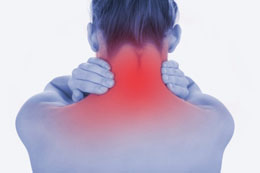Sharp neck pain can be a bane on your life, as it may keep you from functioning optimally. Ergo, it is important that you are familiar with its causes, so that you can tend to it before it causes irreparable damage.

The human neck is designed in such a way that it bears the weight of our skull, thus balancing it properly. Such a body part which is continuously under pressure is quite vulnerable to tightening of the muscles, thereby resulting in a severe neck pain. You may not feel it too much when you do not move your head. However, the pain while turning the head, intensifies, thus causing a lot of trouble and inconvenience.
Sharp Pain in the Neck Could be Caused by...
Incorrect Posture
This is probably the most common cause of neck pain. Maintaining an awkward position while sitting, watching TV, sleeping badly, using a pillow that does not support your head correctly, etc., all lead to neck pain.
Injury
Quite expected! Injury is amongst the most common neck pain causes. A severe blow or injury to any of the neck regions can result in frequent sessions of sharp pain in left side of the neck and also the right, which can continue for a long time thereafter.
Pinched Nerve
Pinched nerve is a condition that is characterized by damage to the nerves of a particular part of the body, either due to compression or direct pressure. When this happens, the nerves cannot perform their function of conducting signals.
Degenerative Disc
Our back region consists of discs which are pad like structures, and act as cushions to lower the impact of any movement on the spinal column. Discs are made up of central softer components and jelly like substances. Damage to the softer components can lead to pain in the neighboring tissues, and therefore pain in the neck too.
Neck Pain Could be Accompanied by...
Stiffness - A common symptom of neck pain is a feeling of tightness and stiffness around the neck and back region, which makes doing anything very uncomfortable. Even routine activities which are otherwise very simple become very difficult to perform.
Dizziness - Neck pain is often linked to dizziness! This happens with people suffering from arthritis of the neck, which leads to formation of bone appendages. The arteries that carry blood to the rear part of the brain run in the cervical spine vertebrae. The bone appendages actually encroach on the space of the blood vessels, thereby blocking the blood supply and further resulting in dizziness.
Pain Elsewhere - In some people, neck pain invites additional problems in the form of back pain and shoulder pain.
Headaches - To make things worse, headaches also occur sometimes along with a sharp pain in the neck. This happens in most of the cases. Sometimes, sharp neck pain at the base of the skull is also observed.
Difficulty in Swallowing - For some people, swallowing problems or difficulty in swallowing are a result of neck pain.
Other Symptoms:
- Lightheadedness
- Glandular swelling
- Pulsations
Relief from Neck Pain
Needless to say, neck pain needs to be relieved quickly, as this is not only irritating, but also affects many of our daily activities, which is certainly not a desirable thing in this busy lifestyle. A commonly used neck pain cure is medication that reduce muscle spasms, pain and inflammation.
Another common treatment involves the use of cervical pillows, which reduces the pain and also maintains the right position and curvature of your neck while sleeping at night. Some doctors also prescribe a cervical collar which is designed to provide support to your neck and maintain its alignment.
Physical therapy is also another effective treatment for neck pain, which aims at curing the pain and improving the mobility of the individual in distress.
Sharp neck pain can be prevented with the help of sitting in the right position, avoiding sitting for a long time in the same position, and by performing exercises that strengthen the shoulder and neck muscles. Hope this article proved useful in knowing all the important aspects of neck pain, be it causes or treatment.
Disclaimer:
The information provided in this article is solely for educating the reader. It is not intended to be a substitute for the advice of a medical expert.


 The human neck is designed in such a way that it bears the weight of our skull, thus balancing it properly. Such a body part which is continuously under pressure is quite vulnerable to tightening of the muscles, thereby resulting in a severe neck pain. You may not feel it too much when you do not move your head. However, the pain while turning the head, intensifies, thus causing a lot of trouble and inconvenience.
The human neck is designed in such a way that it bears the weight of our skull, thus balancing it properly. Such a body part which is continuously under pressure is quite vulnerable to tightening of the muscles, thereby resulting in a severe neck pain. You may not feel it too much when you do not move your head. However, the pain while turning the head, intensifies, thus causing a lot of trouble and inconvenience.